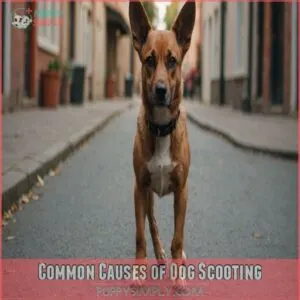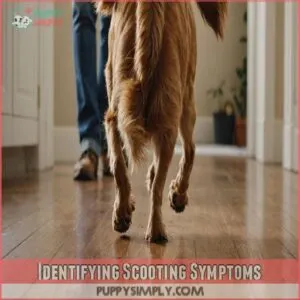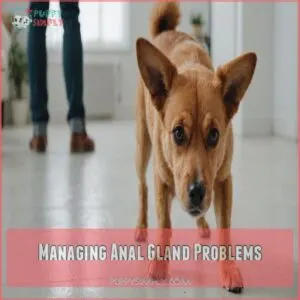This site is supported by our readers. We may earn a commission, at no cost to you, if you purchase through links.
 Is your dog scooting? It’s a sight nobody wants to see!
Is your dog scooting? It’s a sight nobody wants to see!
Thankfully, some home remedies for dog scooting can help.
Try a warm compress to soothe any irritation.
Make sure their bottom is clean, and consider adding fiber to their food.
A little coconut oil might also help.
Remember, though, if it’s persistent, a vet visit is key.
They can rule out anything serious.
We’ll explore more effective home remedies, and discuss when professional help is needed, in the next section.
You’ll be surprised at how much you can do!
Table Of Contents
- Key Takeaways
- Common Causes of Dog Scooting
- Identifying Scooting Symptoms
- Sanitary Clipping and Cleaning
- Providing Soothing Relief
- Dietary Changes to Reduce Scooting
- Managing Anal Gland Problems
- Treating Skin Irritations and Infections
- Preventing Parasite Infestations
- When to Seek Veterinary Help
- Frequently Asked Questions (FAQs)
- How do you get rid of scooting in dogs?
- Are there home remedies for dog scooting (Itchy Bum)?
- What can I give my Dog for scooting?
- Can home remedies help a dog Scoot?
- Can coconut oil help with dog scooting?
- How to stop a dog scooting?
- What can I feed my dog to help with scooting?
- Does dog scooting go away on it’s own?
- Does coconut oil help dog scooting?
- How do you get rid of scooting?
- Can stress contribute to dog scooting?
- What role do allergies play in scooting?
- How does exercise affect anal gland health?
- Can dehydration worsen scooting symptoms?
- Are certain dog breeds more prone to scooting?
- Conclusion
Key Takeaways
- Add fiber to your dog’s diet to help firm up stools and alleviate discomfort related to scooting.
- Use a warm compress on your dog’s rear area twice daily to soothe irritation caused by anal gland issues.
- Clean your dog’s bottom regularly and keep it free from matted fur to prevent skin irritations, such as dry skin issues (common skin conditions) that can cause discomfort and scooting.
- Consider trying coconut oil or omega-3 supplements to improve skin health and reduce inflammation associated with scooting.
Common Causes of Dog Scooting
When you see your dog scooting around, it might be because their rear end is feeling itchy or painful.
Common culprits include full anal glands, skin irritations, pesky parasites, and even some allergies.
Anal Gland Problems
Ever notice your pup scooting its rear like it’s on fire?
Anal gland problems might be the culprit.
These issues can lead to discomfort and even infections.
Keep those glands in check!
Consider these steps to help:
- Anal gland expression – Regularly check and express glands.
- Fiber-rich diet – Help firm up stools.
- Vet visits – For persistent issues and possible surgeries.
Skin Irritations or Infections
When your furry friend starts scooting, skin irritations or infections might be the culprits.
These can stem from various issues like flea bites and treatments, hot spots, or even that pesky diaper rash.
Keeping your dog clean and dry can help soothe itchy skin caused by common allergens like beef or chicken found in dog food for dogs with itchy skin. Keeping your dog clean and dry can help soothe itchy skin and reduce the chance of yeast infections.
A little TLC goes a long way in
Allergies
Is your dog’s scooting driving you bonkers? It might be allergies tickling their tush! Here’s how to manage it:
- Allergy testing can pinpoint the culprits.
- Try eliminating food allergies with a new diet.
- Watch out for environmental triggers like pollen.
- Keep tabs on seasonal allergies sneaking up with the weather.
Manage those pesky skin irritations, and your dog will feel relief!
Endoparasites
Spotting your dog scooting? Itchy bottoms could mean endoparasites like tapeworms.
Tackle this with a simple worming schedule and medication to keep your furry friend comfy.
Remember, regular vet check-ups aren’t just for show—they help in parasite diagnosis!
Stay proactive, and your pup will thank you with extra tail wags.
| Symptom | Solution | Benefit |
|---|---|---|
| Itchy bottom | Worming schedule | Relief from itching |
| Scooting | Vet visit | Precise diagnosis |
| Tail wags | Tapeworm prevention | Happy, healthy pet |
Pain
You’re probably wondering why your dog scoots across the floor.
Often, pain is to blame, making them pretty uncomfortable.
Here’s what might be causing it: If you notice your pup scooting, it could be a sign of impacted anal glands, which can be painful and uncomfortable.
Surgery or injuries may lead to pain.
Anal gland problems cause discomfort.
Abscesses are painful pockets of infection.
Hernias can hurt.
Matting around the rear can tug and pull painfully.
Gastrointestinal Issues
Pain isn’t the only pesky problem.
Your dog’s diet might be stirring up trouble too.
Gastrointestinal issues, like constipation or diarrhea, can cause scooting.
Adding dietary fiber and probiotics for dogs might help keep their gut happy.
Digestive enzymes can aid digestion, reducing discomfort and potential food sensitivities.
Think of it as one of the quirks of dog ownership!
Identifying Scooting Symptoms
When your furry friend starts scooting across the with determination, it’s time to play detective.
Look out for signs like frequent scooting, licking, or unusual tail positions to figure out what’s bugging them.
Frequent Scooting
Ever seen your pup dragging its behind across the floor?
Frequent scooting might signal anal gland problems, allergies, or even an itchy bottom from other causes.
It’s not just a quirky dog behavior; it might require some vet advice or prevention tips.
Consider home remedies like Omega-3s for inflammation or warm compresses to calm those canine anal glands.
Licking or Biting at The Rear End
If you’ve noticed your furry friend scooting frequently, keep an eye out for licking or biting at their rear end.
This behavior often signals discomfort from anal gland issues, skin allergies, or even parasite problems.
Imagine it like an itch you just can’t reach!
Regular vet visits and proper parasite prevention can help tackle these canine anal gland issues effectively.
Holding The Tail in an Unusual Position
Spotting your dog holding its tail in an unusual position might make you raise an eyebrow.
It’s like their version of flashing a warning sign.
This behavior can signal discomfort, possibly from anal gland issues or other underlying causes.
Keeping an eye on their tail position can help you catch potential pain signals early, ensuring your furry friend stays comfortable.
Modifying Their Walk
During walks, has your dog’s gait changed?
Notice any limping, stiffness, or dragging of a leg?
Uneven steps or reduced mobility could signal anal gland problems, parasites, allergies, or even a urinary tract infection.
These are all potential causes of dog scooting.
Don’t ignore these subtle shifts; they’re important clues!
A vet visit might be in order if you see these changes.
Swelling or Abnormalities
Noticing your pooch’s walk seems a little off?
Check if there’s swelling or abnormalities around their rear.
These could signal anal gland issues, like impaction or abscesses, causing discomfort and dog scooting.
Sometimes, swollen areas lead to anal sac problems needing vet consultation.
Keep home remedies on standby, but always consider professional advice for a proper abnormality diagnosis.
Sanitary Clipping and Cleaning
Keeping your dog’s rear clean by trimming matted fur and debris can really help stop the embarrassing hallway scoot. Plus, a tidy tush reduces the risk of annoying skin irritations.
Removing Matted Fur or Debris
Your pup’s scooting isn’t just a quirky move—matted fur or debris could be the villain here.
If you need help with trimming your dog’s rear end, consider investing in a specialized set of clippers to keep things clean and comfortable.
Grab your grooming tools and tackle those tangles.
By using proper clipping techniques, you can keep your dog’s rear end clean and comfy.
Avoiding a dirty butt helps prevent those pesky anal gland problems.
Just like that, scooting may become a distant memory!
Preventing Skin Irritations
Now that your furry friend’s got a clipped tush, let’s tackle skin irritations.
Keeping things clean helps avoid those pesky skin allergies and makes scooting less appealing.
Use regular sanitary clipping and cleaning to fend off moisture buildup and banish itch-triggering debris.
It’s like giving your dog a spa day!
A little effort now means happier tails later.
Providing Soothing Relief
When your furry pal starts scooting their butt, it might be time for some soothing relief.
From warm compresses to calming baths, you’ve got a few tricks up your sleeve to help them feel better.
Warm Compresses
Imagine your poor pup scooting around, trying to find relief.
A warm compress might be just what they need.
Here’s how to apply it:
- Frequency: Give it a whirl twice daily.
- Duration: Keep it cozy for 5–10 minutes each time.
- Materials: Use a clean cloth dipped in warm (not hot!) water.
It soothes those pesky anal gland problems!
Soothing Baths
A few soothing baths can work wonders!
Use lukewarm water, not too hot, and gentle, dog-friendly shampoo, such as those found in dog shampoo products.
Avoid harsh chemicals.
Pay attention to bath frequency; once a week is usually enough unless your pup’s got a serious skin allergy or is itching constantly.
After the bath, gently towel-dry your pooch.
Calendula or Epsom Salt Compresses
Is your dog still scooting after baths?
Calendula or Epsom salt compresses might just be your new best friends.
Calendula soothes irritation, while Epsom salts work wonders on inflammation.
Simply apply a warm compress and watch your pup relax.
But remember, if scooting persists, it’s wise to consult your vet.
This little trick can be part of your home remedies arsenal!
Dietary Changes to Reduce Scooting
Adjusting your dog’s diet can make a big difference in reducing scooting. By adding fiber and omega-3 fatty acids, or considering allergy-specific foods, you can help soothe their rear-end troubles.
Feeding a High-Fiber Diet
To soothe your scooting dog after a soothing bath, consider a high-fiber diet.
It can help with anal gland problems and constipation risks. Adding fiber can also help firm up stools, naturally expressing anal glands to prevent discomfort.
Consider switching to a hypoallergenic dog food brand that suits your pet’s needs, as some dogs may be allergic to common proteins like beef or chicken hypoallergenic dog food brands reviews. Add fiber-rich treats or try specific dog food brands. You might whip up homemade recipes or use fiber supplements to boost their diet.
- Fiber-rich
Adding Omega-3 Fatty Acids
A fiber-rich diet’s a great start, but consider adding Omega-3 fatty acids too.
They’re known for improving skin health and reducing inflammation.
Fish oil is a popular source, helping with dog scooting and even anal gland problems.
Choose supplements wisely and stick to dosage guidelines for the best results.
Your furry friend will feel comfier in no time!
Considering Allergy-Specific Foods
You’ve tossed some Omega-3 goodness into their bowl, so why not try allergy-specific foods next?
Tackling dog scooting through food can be a game-changer.
Consider these steps:
- Allergy testing can pinpoint troublemakers.
- Food trials help identify what suits your furry friend.
- Holistic diets might be the ticket to resolving those itchy moments.
Managing Anal Gland Problems
Managing your dog’s anal gland problems can save them from scooting and you from unwanted surprises on the carpet.
By expressing their glands regularly and adding fiber to their diet, you’ll keep them—and your floors—happy.
Expressing Anal Glands
Dealing with anal gland issues? Don’t panic! Understanding your dog’s anal gland anatomy is key.
Expressing anal glands at home might seem intimidating, but it’s often manageable.
Look for signs of impaction like scooting or excessive licking.
However, improper expressing anal glands can cause complications, so proceed with caution.
If unsure, always consult your vet.
Regular vet checkups help prevent dog anal gland impaction.
Remember, prevention is better than cure!
Using Supplements for Anal Gland Health
When life gives your pup anal gland problems, don’t just sit and bark—try supplements for relief!
The best anal gland supplements, like omega-3 fatty acids or digestive enzymes, can support natural remedies.
They’re a little like vitamins for your dog’s behind, helping ease scooting woes.
Remember, consistency is key to keeping those dog anal gland issues in check!
Foods Rich in Fiber
After exploring supplements for anal gland health, which can be affected by chronic ear infections and skin issues as seen in Springer Spaniels with poor hygiene and diet why Springer Spaniels smell, let’s look at foods rich in fiber.
Adding dietary fiber for dogs can be your secret weapon against dog scooting.
Toss in fiber-rich fruits and veggies or whip up homemade fiber diets.
Fiber supplementation, like fiber-rich treats, firms up stools, helping manage anal gland problems and offering a tasty home remedy for dog scooting.
Treating Skin Irritations and Infections
When your dog’s scooting is due to skin irritations or infections, it’s time to roll up your sleeves.
You can help soothe their discomfort by using simple remedies like calendula or Epsom salt compresses and probiotics.
Applying Calendula or Epsom Salt Compresses
You’re already on the ball with anal gland concerns, so let’s chat about soothing skin irritations.
Calendula or Epsom salt compresses can calm your dog’s itchy spots, much like how colloidal oatmeal baths can soothe itchy skin.
Here’s how to DIY a compress:
- Combine: Mix calendula or Epsom salt in warm water
Using Probiotics
Switching from calendula compresses, let’s chat about using probiotics to help with your dog’s skin troubles.
These tiny helpers boost gut health and, believe it or not, aid skin healing.
They fend off allergies and strengthen the immune system.
Dog still scooting? Probiotics might be what your pup’s tummy ordered!
| Benefit | How It Helps | Example |
|---|---|---|
| Gut Health | Balances bacteria | Yogurt |
| Skin Health | Reduces irritation | Supplements |
| Immune System | Boosts defense | Probiotic chews |
Preventing Parasite Infestations
You wouldn’t want your furry friend to scoot around the house due to pesky parasites, right?
Regular deworming, using flea and tick prevention, and keeping your dog’s environment clean are essential to keep those unwanted guests away.
Deworming Regularly
Regular deworming is key to preventing those pesky parasites!
Think of it as preventative maintenance for your furry friend.
Here’s what you need to know:
- Discuss deworming frequency with your vet.
- Learn about different deworming types.
- Establish a deworming schedule.
- Watch for worm symptoms like scooting.
Early detection helps avoid major issues, saving you stress and your pup discomfort.
Remember, a healthy gut means a happy dog!
Using Flea and Tick Prevention
After battling worms, don’t let fleas and ticks crash the party.
Flea and tick prevention can safeguard your dog from pesky parasites and skin allergies.
Try natural remedies or explore the best products to keep itching at bay.
Just follow application tips to avoid safety concerns.
| Issue | Solution |
|---|---|
| Fleas and Ticks | Prevention Products |
| Skin Allergies | Natural Remedies |
| Application Worries | Tips for Safe Use |
Keeping The Living Environment Clean
While staying ahead of fleas is important, tidying up your dog’s living space can prevent parasite parties.
Use dog-friendly cleaning products; they’re safe and sniff-friendly. Better indoor air quality equals fewer allergies, so don’t skip dusting and vacuuming.
Flea control starts outside too—think yard sanitation.
A well-kept area reduces dog scooting, parasites, and those pesky anal gland problems.
When to Seek Veterinary Help
Your furry friend might need professional help if scooting is persistent or they’re showing signs of pain.
While some remedies can work wonders, sometimes you’ve got to leave it to the pros.
Signs of Severe Scooting or Discomfort
Imagine your pup scooting like it’s got wheels.
It might be more than quirky behavior.
Look out for signs like blood, excessive licking, painful yelping, or loss of appetite.
Abnormal swelling and dog scooting could signal anal gland problems or even a dog anal gland impaction.
If these symptoms hit home, reach out to your vet pronto!
Indications of Underlying Medical Issues
If your pup’s backside antics continue beyond 48 hours, it’s time for a vet consultation.
Conditions such as a dog bottom red and swollen from anal gland disease, diarrhea, or allergies could be the cause of the scooting.
Persistent scooting could shout underlying conditions like allergies, urinary tract infections, or anal gland issues.
Addressing these scooting causes with the right treatment options and preventative care keeps
Importance of Regular Veterinary Check-Ups
Spotting hidden issues early keeps your pup wagging a healthy tail.
Regular vet check-ups are priceless for preventative care and health monitoring.
They catch urinary tract infections, anal gland issues, and other problems before they escalate.
Remember, keeping tabs on your dog’s health isn’t just smart—it’s loving.
Here’s a quick list:
- Early detection saves future trouble
- Preventative care gives peace of mind
- Health monitoring for long-term happiness
- Uncover hidden issues
- Solid veterinary advice
Frequently Asked Questions (FAQs)
How do you get rid of scooting in dogs?
To stop your dog from scooting, trim matted fur, clean their hind area, and try omega-3 supplements for skin health.
A warm compress can soothe irritation.
Always check with your vet for persistent issues or discomfort.
Are there home remedies for dog scooting (Itchy Bum)?
Try these home remedies for your dog’s scooting: addressing anal sac issues commonly caused by anal sac problems, trim and clean their rear, use a warm compress, add omega-3 supplements, give soothing baths, and increase fiber in their diet.
Always check with your vet first!
What can I give my Dog for scooting?
When your pup’s acting like it’s got ants in its pants, give soothing baths, omega-3 supplements, or fiber like pumpkin.
But, always check with the vet for safe remedies, just in case Rover’s serious.
Can home remedies help a dog Scoot?
Sometimes scooting can be a sign of worms in dogs, such as finding worm segments in stool or visible worms, which can be treated with remedies for treating worms. Home remedies can offer relief if your dog’s scooting isn’t serious.
Try sanitary clipping, warm compresses, or soothing baths.
However, if it persists or your dog’s in pain, it’s best to consult a vet for advice.
Can coconut oil help with dog scooting?
Yes, coconut oil might help with dog scooting by soothing irritated skin and acting as a mild anti-inflammatory.
Just apply a small amount externally, but don’t forget to check with your vet before trying new remedies.
How to stop a dog scooting?
It’s a real pain when your pup’s scooting!
First, check for obvious irritants.
Then, try a warm compress and gentle cleaning.
If it persists, see a vet; they’re the best at sniffing out the problem!
What can I feed my dog to help with scooting?
Adding fiber to your dog’s diet can help with scooting issues.
Try high-fiber dog food or add pumpkin to their meals.
It firms up stool, helping naturally express anal glands and prevent discomfort.
Does dog scooting go away on it’s own?
Dog scooting often needs attention, like a diet change or vet visit.
While minor issues might resolve on their own, persistent scooting suggests underlying problems.
So don’t leave it to chance if it lasts more than a day.
Does coconut oil help dog scooting?
Imagine this: your dog dragging its behind on the floor, not a pretty sight, right?
Coconut oil might help, soothing irritated skin due to its moisturizing properties.
But do consult your vet before using it.
How do you get rid of scooting?
To tackle dog scooting, try a soothing warm compress, give a fiber boost to help with digestion, or keep their rear end clean and tidy.
Scooting persists over 48 hours, it’s time for a vet visit!
Can stress contribute to dog scooting?
Think of stress like an unseen itch; it can sometimes make your pup scoot.
While stress isn’t a common cause, changes in routine or environment might contribute to scooting.
Always rule out medical issues first, though.
What role do allergies play in scooting?
Allergies often cause itchiness and skin irritation around your dog’s rear, leading to scooting.
Flea bites, food allergies, or environmental triggers can make your pup uncomfortable.
Keep an eye out and get it checked by a vet.
How does exercise affect anal gland health?
Did you know, regular exercise helps your pup’s digestion? This aids natural anal gland expression, reducing scooting. A healthy gut equals a happy, less-itchy bum! Keep those walks coming!
Can dehydration worsen scooting symptoms?
You betcha, dehydration can make scooting worse for your pup!
Without enough water, their stool gets hard, making it tough to pass.
This can irritate the anal glands, leading to more discomfort and scooting.
Are certain dog breeds more prone to scooting?
Some dog breeds, like Chihuahuas and Dachshunds, are more prone to scooting.
Their small size can lead to anal gland issues.
It’s kind of like having a tiny car with a high-maintenance engine—requires extra care.
Conclusion
Coincidentally, as your dog finds a way to show their discomfort, you’ve learned some handy home remedies for dog scooting!
Using warm compresses, a clean bottom, and a balanced diet could make all the difference.
While coconut oil and extra fiber work wonders, remember—you’re not a substitute for the vet.
If the scooting persists, it’s time to seek professional help.
Always aim for happy wagging tails, not dragging ones, by addressing their needs promptly.
- https://vcahospitals.com/know-your-pet/allergy-general-in-dogs
- https://www.akc.org/expert-advice/health/noticing-dog-uti-symptoms-could-be-something-more/
- https://www.glandex.com/
- https://www.petmd.com/blogs/thedailyvet/ken-tudor/2014/january/overlooked-health-conditions-caused-pet-obesity-31258
- https://www.caninejournal.com/home-remedies-for-dog-scooting/















